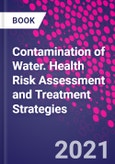Water containing significant amounts of inorganic and organic contaminants can have serious environmental consequences and serious health implications when ingested. Contamination of Water: Health Risk Assessment and Treatment Strategies takes an interconnected look at the various pollutants, the source of contamination, the effects of contamination on aquatic ecosystems and human health, and what the potential mitigation strategies are. This book is organized into three sections. The first section examines the sources of potential contamination. This includes considering the current scenario of heavy metal and pesticide contamination in water as well as the regions impacted due to industrialization, mining, or urbanization. The second section goes on to discuss water contamination and health risks caused by toxic elements, radiological contaminants, microplastics and nanoparticles, and pharmaceutical and personal care products. This book concludes with a section exploring efficient low-cost treatment technologies and remediation strategies that remove toxic pollutants from water. Contamination of Water incorporates both theoretical and practical information that will be useful for researchers, professors, graduate students, and professionals working on water contamination, environmental and health impacts, and the management and treatment of water resources.
Please Note: This is an On Demand product, delivery may take up to 11 working days after payment has been received.
Table of Contents
Section A Water contamination1. Contamination of water resources in the mining region
Anita Punia and Saurabh Kumar Singh
2. Contamination of water resources in and around saline lakes
Deepali Singh, Priyadarshini Singh, Harshita Asthana, Nidhi Roy and Saumitra Mukherjee
3. Contamination of groundwater by fly ash heavy metals at landfill sites
Krishna Rawat and Bhawana Pathak
4. Current scenario of heavy metal contamination in water
Rahul Sharma, Pinki Rani Agrawal, Ravi Kumar, Gaurav Gupta and Ittishree
5. Health impacts due to fluoride contamination in water: current scenario
Amandeep Kaur, Ritu Bala, Surinder Singh Bhinder and Sushil Kumar Kansal
6. Contamination of water resources in industrial zones
Gyanendra Tripathi, Arbab Husain, Suhail Ahmad, Ziaul Hasan and Alvina Farooqui
7. Contamination of groundwater resources by pesticides
Muneer Ahmad Malla, Shruti Gupta, Anamika Dubey, Ashwani Kumar and Shweta Yadav
8. Current scenario of pesticide contamination in water
Prachi Rajput, R.K. Sinha and Pooja Devi
Section B Health risk assessment
9. Contamination of water resources with potentially toxic elements and human health risk assessment: Part 1
Farah Ma'arfi, Mohd Yasir Khan, Arbab Husain, Afreen Khanam and Ziaul Hasan
10. Contamination of water resources with potentially toxic elements and human health risk assessment: Part 2
Asmita Gupta, Swati Wanwari, Madan Kumar and Indu Shekhar Thakur
11. Chemical water contaminants: potential risk to human health and possible remediation
Vinod Kumar Chaudhary, Shailendra Kumar Singh, Arun Lal Srivastav, Anurag
12. Fluoride contamination in water resources and its health risk assessment
Amit Saini and Pinki Rani Agrawal
13. Arsenic contamination in water resources and its health risk assessment
Gongutri Borah, Prashurya Pritam Mudoi and Preetismita Borah
14. Integrated assessment of ammonia-nitrogen in water environments and its exposure to ecology and human health
Kristina Medhi
15. Radiological contaminants in water: pollution, health risk, and treatment
Sanchayita Rajkhowa, Jyotirmoy Sarma and Anupama Rani Das
16. Organic pollutants in water and its health risk assessment through consumption
Ankita Ojha and Dhanesh Tiwary
17. Nanomaterial and microplastic-based contamination in water and its health risk assessment
Upama Baruah, Gautomi Gogoi, Achyut Konwar and Bedanta Gogoi
18. Pharmaceuticals and personal care products: occurrence, detection, risk, and removal technologies in aquatic environment
Bipasha Ghosh, Ashish Sengar, Arif Ahamad and Rao Faraz Waris
19. Emerging pollutants in water and human health
Syed Saquib, Amit Kumar Yadav and Kalp Bhusan Prajapati
Section C Water treatment strategies
20. Process intensification in wastewater treatments
Kailas L. Wasewar
21. Process intensification in wastewater treatments: basics of process intensification and inorganic pollutants
Kailas L. Wasewar
22. Treatment of contaminated water: membrane separation and biological processes
Suantak Kamsonlian, Saurabh Yadav, Kailas S. Wasewar, Ankur Gaur and Sushil Kumar
23. Process intensification in wastewater treatments: advanced oxidation processes for organic pollutants
Dharm Pal, Vijyendra Kumar, Gamini Sahu and Kailas L. Wasewar
24. Process intensification in wastewater treatment: cavitation and hybrid technologies for organic pollutants
Md Raihan Arfin, Parul Katiyar, Kailas LWasewar and Sushil Kumar
25. Bio-inspired materials for adsorptive removal of water pollutants
Yong Chen and Steplinpaulselvin Selvinsimpson
26. Oxidative stress biomarkers in cyanobacteria exposed to heavy metals
Sadaf Mahfooz, Adeeba Shamim, Arbab Husain, Ziaul Hasan and Alvina Farooqui
27. Sulfur-based advance nanomaterials for water treatment
Sumbul Hafeez
28. Inorganic nanotubes for water treatment through adsorption and photocatalytic degradation
Amal Krishna Saha, Shashikant Shivaji Vhatkar and Ramesh Oraon
29. Graphene oxide-based nanocomposites for adsorptive removal of water pollutants
Priti Malhotra and Arti Jain
30. Ferrite based magnetic nanocomposites for wastewater treatment through adsorption
Atul Sharma, Arshi Choudhry, Geetanjali Rathi, Nusrat Tara, Noufal Komby Abdulla, Md. Sajid and Saif Ali Chaudhry
31. Magnetically separable (carbon) graphene oxide based nano-composites for water treatment
Pinki Rani Agrawal, Rahul Sharma and Ravi Kumar
32. Phytogenic plant-based nanocomposites for water treatment
Arshi Choudhry, Atul Sharma, Nusrat Tara, Geetanjali Rathi, Noufal Komby Abdulla, Md. Sajid, A.M. Khan and Saif Ali Chaudhry
33. Graphene, graphene oxide, and reduced graphene oxide-based materials: a comparative adsorption performance
Nusrat Tara, Atul Sharma, Arshi Choudhry, Noufal Komby Abdulla, Geetanjali Rathi, A.M. Khan and Saif Ali Chaudhry
34. Progress in carbon nanotubes for water treatment
Neha Abbasi and Tabrez Alam Khan
35. Adsorptive removal of water pollutants using reduced graphene oxide-based nanocomposites
Avinash Kumar Pandey, Surabhi Kirti Mishra and Pragati Gahlout
36. Multifunctional organic-inorganic materials for water treatment
Geetanjali Rathi, Arshi Choudhry, Shoaib Khan, Atul Sharma, Nusrat Tara, Noufal Komby Abdullah, Sharf Ilahi Siddiqui, A.M. Khan and Saif Ali Chaudhry
37. 4d Metal-based nanomaterials for water treatment
Anupma Thakur and Pooja Devi
38. Magnetically separable graphene oxide-based spinel ferrite nanocomposite for water remediation
Sanjeet Kumar Paswan, Rajnish Kumar, Pawan Kumar, Ram Kishore Singh, Ashish Kumar, Sushil Kumar Shukla and Lawrence Kumar
39. Microbial fuel cell: a greener way to protect the environment
Sangeeta, Poorna Khanna, Kapinder, Tarkeshwar and Amit Kumar








